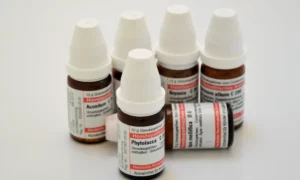Homeopathy, an alternative medical system that originated in the late 18th century, has gained popularity in recent years as a complementary approach to various health conditions. One area where homeopathy is increasingly being explored is in the management of Polycystic Ovary Syndrome (PCOS). In this article, we delve into the principles of homeopathy, its application in treating PCOS, and the comparative aspects of conventional treatments.
Contents
Understanding PCOS 
PCOS stands for Polycystic Ovary Syndrome. It is a common health condition that affects people with ovaries, often during their reproductive years. PCOS is characterized by hormonal imbalance, which can lead to a variety of symptoms and issues.
Key features of PCOS include:
- Irregular Menstrual Cycles: Women with PCOS may experience irregular or prolonged menstrual cycles, or they may have fewer than eight menstrual cycles per year.
- Hyperandrogenism: Elevated levels of androgens (male hormones) can cause symptoms such as acne, excess facial and body hair (hirsutism), and male-pattern baldness.
- Polycystic Ovaries: The ovaries may develop small collections of fluid (follicles) and fail to regularly release eggs. Despite the name, not all women with PCOS have ovarian cysts.
- Insulin Resistance: Many individuals with PCOS have insulin resistance, which can lead to higher levels of insulin in the blood. This may contribute to weight gain and an increased risk of type 2 diabetes.
- Metabolic Issues: PCOS is associated with an increased risk of metabolic problems, including obesity, high blood pressure, and abnormal cholesterol levels.
The exact cause of PCOS is not fully understood, but it is believed to involve a combination of genetic and environmental factors. It can have implications for fertility, as irregular ovulation may lead to difficulty conceiving. Additionally, PCOS is associated with an increased risk of other health conditions, such as type 2 diabetes and cardiovascular diseases.
Understanding Homeopathy
Homeopathy is a form of alternative medicine that was developed in the late 18th century by Samuel Hahnemann, a German physician. The fundamental principle of homeopathy is “like cures like,” which means that a substance that causes symptoms in a healthy person can be used in diluted form to treat similar symptoms in a sick person. This principle is known as the Law of Similars.
Key principles and practices of homeopathy include:
- Law of Similars: As mentioned, this is the central concept in homeopathy. Substances that produce symptoms in a healthy individual are used in highly diluted forms to stimulate the body’s natural healing processes for similar symptoms in an unwell person.
- Individualized Treatment: Rather than focusing solely on the disease or specific symptoms, homeopaths take into account the unique characteristics of the person, including emotional and mental aspects.
- Dilution and Succussion: Homeopathic remedies are typically prepared through a process of serial dilution and succussion (vigorous shaking). This is believed to enhance the healing properties of the substance while minimizing any potential toxicity.
- Comprehensive Approach: Homeopathy considers the whole person, taking into account the physical, emotional, and mental aspects of health. The goal is to stimulate the body’s vital force to restore balance and promote overall well-being.
It’s important to note that the principles of homeopathy are not consistent with the understanding of chemistry and physics in conventional medicine. Homeopathic remedies are often highly diluted, to the point where they may not contain detectable molecules of the original substance. As a result, the scientific basis for the efficacy of homeopathy is a topic of controversy.
Homeopathy And PCOS 
When it comes to PCOS, homeopathy focuses on identifying the unique symptoms and addressing the underlying imbalances. Remedies such as Pulsatilla, Sepia, and Lachesis are commonly used based on individual presentations of symptoms. The holistic nature of homeopathic treatment aims to not only manage the symptoms but also improve overall well-being.
Top Homeopathic Medicines For PCOS
- Sepia
- Sepia is the top medicine for treating Polycystic Ovarian Syndrome (PCOS) and is especially good for women whose periods are late and not very heavy.
- Sepia works well to make sure periods happen at the right time. It can also help with infertility caused by PCOS.
- It is effective in controlling abnormal hair growth on the face, especially the upper lip.
- Look for other symptoms like sensitivity to cold, feeling irritable, and emotional insensitivity towards close people.
- Pulsatilla
- Pulsatilla is a natural medicine for PCOS, especially for women with very few and extremely painful periods.
- Pulsatilla helps remove obstacles causing suppressed periods, allowing them to flow normally.
- It’s beneficial for young girls with irregular periods due to PCOS. Physical symptoms to consider include no thirst and a desire for cool air. Mentally, the person is mild, sensitive, and tends to cry easily, feeling better with consolation.
- Calcarea Carb
- Calcarea Carb is helpful for PCOS when periods are heavy and last longer than usual.
- It’s also good for women with weight gain and obesity due to PCOS, helping reduce excess weight.
- Look for physical symptoms like excessive head sweating, extreme sensitivity to cold, and unusual cravings like boiled eggs or even strange things like chalk and lime.
- Natrum Mur
- Natrum Mur is beneficial for women with PCOS who have irregular and suppressed periods.
- It helps regulate menstrual cycles and can be considered for those facing difficulty conceiving due to PCOS.
- Symptoms to watch for include feeling excessively hot, avoiding the sun’s heat, and craving extra salt in the diet.
- The person may reserve themselves mentally, weep alone, and experience worsening symptoms when offered sympathy.
Complementary Lifestyle Changes 
Complementary lifestyle changes can play a significant role in managing PCOS symptoms. Here are some complementary lifestyle changes that may help manage PCOS:
- Balanced Diet
- Low-Glycemic Foods: Choose complex carbohydrates with a low glycemic index to help manage insulin levels. Include whole grains, legumes, and vegetables.
- Lean Proteins: Incorporate lean protein sources such as poultry, fish, tofu, and legumes.
- Healthy Fats: Opt for sources of healthy fats like avocados, nuts, seeds, and olive oil.
- Regular Exercise
- Aerobic Exercise: Engage in regular aerobic activities like walking, jogging, or cycling to improve insulin sensitivity and support weight management.
- Strength Training: Include strength training exercises to build muscle mass, which can help regulate hormones.
- Weight Management
- Maintain a Healthy Weight: For overweight individuals, even a modest weight loss can improve symptoms. Consult with a healthcare professional for personalized guidance.
- Hydration
- Adequate Water Intake: Stay well-hydrated to support overall health and assist in the elimination of toxins.
- Stress Management
- Mind-Body Techniques: Practice stress-reducing techniques such as yoga, meditation, deep breathing, or mindfulness to help manage stress hormones.
- Adequate Sleep: Ensure you get sufficient, restful sleep as lack of sleep can impact hormonal balance.
- Regular Check-ups
- Health Monitoring: Regularly monitor your blood sugar levels, cholesterol, and blood pressure with the guidance of your healthcare provider.
- Supplements
- Consultation with Healthcare Provider: Discuss the potential benefits of supplements such as inositol, omega-3 fatty acids, and vitamin D with your healthcare provider.
- Limit Processed Foods and Sugar
- Minimize Sugary Foods: Reduce the intake of sugary foods and beverages, as they can affect insulin levels.
- Avoid Processed Foods: Limit processed and refined foods, opting for whole, nutrient-dense options.
- Regular Menstrual Cycle Tracking
- Monitoring Menstrual Cycles: Track your menstrual cycles to provide valuable information to your healthcare provider about your hormonal health.
Conclusion
In conclusion, homeopathy offers a holistic and individualized approach to PCOS management. By understanding its principles, exploring case studies, and comparing it with conventional treatments, individuals can make informed choices aligned with their health goals. The integration of homeopathy, dietary changes, and lifestyle adjustments forms a comprehensive strategy for addressing the complexities of PCOS.
If you are facing PCOS related issues, PCOS treatment at HerMantra can help. Book your free trial online pcos treatment session now.





